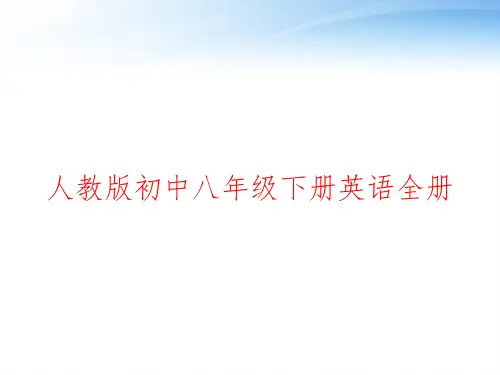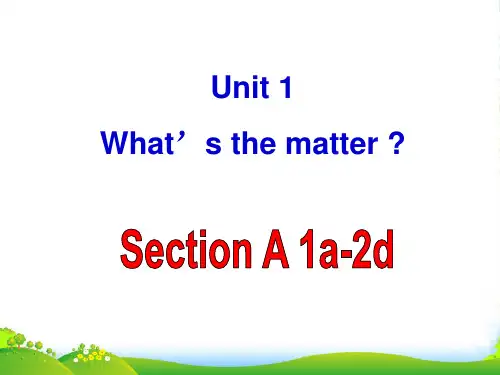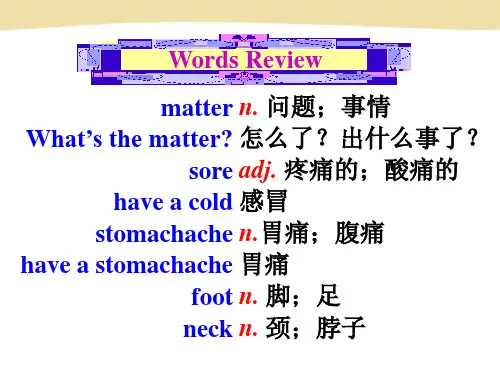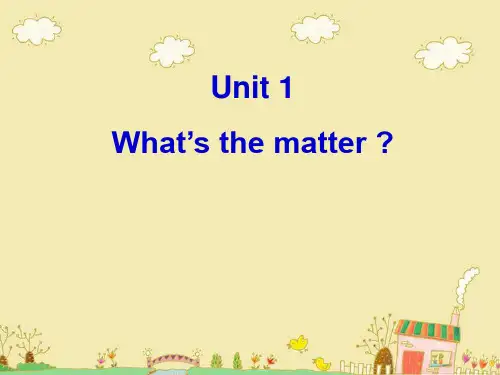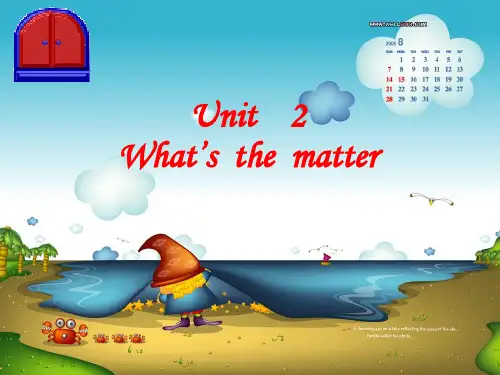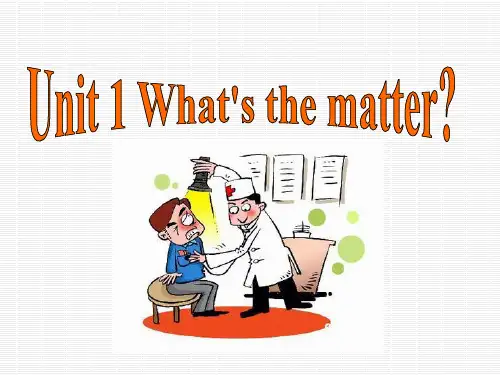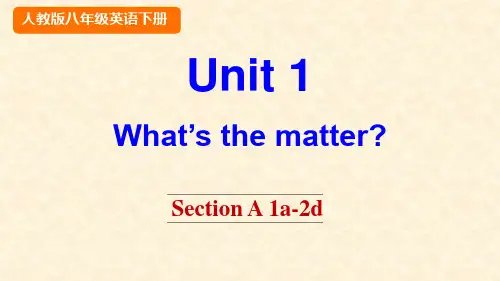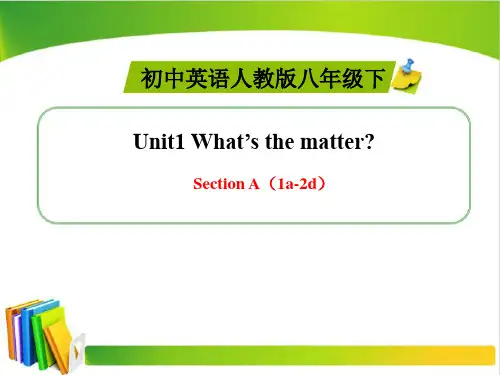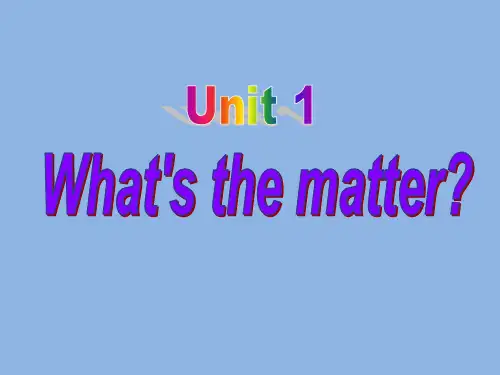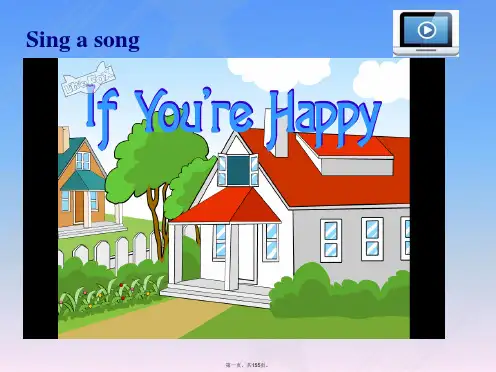- 1、下载文档前请自行甄别文档内容的完整性,平台不提供额外的编辑、内容补充、找答案等附加服务。
- 2、"仅部分预览"的文档,不可在线预览部分如存在完整性等问题,可反馈申请退款(可完整预览的文档不适用该条件!)。
- 3、如文档侵犯您的权益,请联系客服反馈,我们会尽快为您处理(人工客服工作时间:9:00-18:30)。
Let’s learn the parts of the body.
What’s the matter?
I have a stomachache. I have a sore back. I have a toothache.
Explanation
1. What’s the matter?
这是询问病人病情时最常用的问句, 意思是“怎么了?”, 其后通常与介词with 连用。类似的问句还有: What’s wrong? What’s wrong with you? What’s your trouble? What’s the trouble with you? What’s up?
来表示向对方提出建议和忠告, 或者表示某种义务或责
任。其否定式为 shouldn’t。变为一般疑问句时should
提到主语的前面。
例如: We should study hard. 我们应该努力学习。 We shouldn’t listen to music in class. 我们不应当课 know the body parts just now. They are in altogether in one family, but I want to tell you that they can’t friendly. They will have a fight sometimes. If you can’t believe, let’s watch the programe -----Body fight. After the programe, ask the Ss: Now, do you know ----Why do they fight? What are they fight for? Ss:Who is important? T:Good! Do you think who is the most important ? And tell me the reason, Why? S1:Mouth, because I can’t eat to live without it. T:What else can mouth do? S1:Drink, speak English, sing songs, talk with my friends…… S2:Ears, because I can’t grab my pen without them. S3:Fingers, because I can’t grab my pen without them. …… (as many as they can tell)
第三人称单数知识扩充:
一、人称代词he, she, it是第三人称单数。 如: He likes watching TV. 他喜欢看电视。 It looks like a cat. 它看起来像只猫。
二、单个人名、地名或称呼作主语;是第三人称单数。
如: ①Han Mei looks like her mother. 韩梅看起来像她的母亲。
2. I have a sore throat. 我喉咙痛。
1) have vt. 患(得)病, (不用于进行时态)
He had a bad cold last week.他上周患了重感冒
She often has a stomachache. 她常胃(肚子)疼。
一般情况下用have+a+n. 表示患了某种疾
5. hot tea with honey 加蜜热茶 1) hot adj. 热的 2) with 介词, 意思是“ 有, 用, 同……,由于,
和……一致, 赞成, 关于”, 此句中是 “有, 带有……”的意思。 如: 有四个口袋的外套
a coat with four pocket
Ⅰ.句型转换
1. You should write him a letter. (就划线部分提问) _W__h_a_t __ s_h_o_u__ld__ __y_o_u___do?
throat hurt是一个动词,指“刺痛,使受伤痛”。
如:He hurts his leg.他伤了腿。还可以说“His leg hurts.”他腿疼。
ache 这个单词本身就是一个单独 的单词,表示“疼痛”的意思,与tooth、 head等单词合在一起组成一个新的单词, 这就叫做复合名词,发音为/eg/。
Ⅱ. 用所给动词的正确形式填空
1. You should _g__o____(go) to see a doctor. 2. Mother asked me _t_o__g_e_t__(get) up early. 3. They are _p_la_n_n__in_g___ (plan) how to spend the
She has a cold. ( with 谁就问谁) 5. What’s the matter with her / him /it?
She / He/ It has a cold. ( with 宾格,回答变主格)
have a bad cold 严重的感冒
have a high fever 发高烧
病。如:(固定词组)
咳嗽 have a cough
感冒 have a cold
牙疼 胃疼 发烧
have a toothache have a stomachache have a fever
have a …/has a… 如: I have a cold. She has a cold.
I have a toothache. She has a toothache. I have a headache. She has a headache. 4. Hurt 是受伤的意思,表示什么受伤。 如:My leg hurts. His legs hurt. Her arm hurts
②Beijing is in China. 北京在中国。 ③Uncle Wang often makes cakes. 王叔叔经常做蛋糕。 三、单数可数名词或“this / that / the+单数可数名词”作 主语时,是第三人称单数。如: ①A horse is a useful animal. 马是有用的动物。 ②This book is yours. 这本书 是你的。 ③That car is red. 那辆小汽车是红色的。 ④ The cat is Lucy‘s. 这只猫是露茜的。
See the doctor; Take some medicine; Drink hot water;
Lie down and rest.
A: Should I put some medicine on it? B: Yes, you should./ No, you shouldn’t.
You should go to see a doctor. 你应该去看医生。
(改为同义句) Your best friend is _m__o_r_e_ __p_o_p_u_la_r_ than you. 4. He has some money, too. (改为否定句) Hed_o_e_s_n_’_t_ _h_a_v_e__ __a_n_y_ money, __e_it_h_e_r_.
be in a fever
在发烧
1) matter n.问题, 麻烦, 事件, 通常与 介词 “with”连用。
2) wrong是形容词, 前面没有“the”; matter和trouble都是名词, 前面应有 “the”, trouble前还可以用形容词性 的物主代词。
What’s your trouble, young man? 年轻人, 你怎么了?
should 应该做某事
(提出建议)
should 情态动词, 没有人称和数的变化
结构: should + 动词原形
否定: should not (shouldn’t) + 动词原形
should除了作 shall的过去式外,还表示”应该,应当”,
后加动词原形,可用于各种人称。它比 must 委婉, 用
summer holiday. 4. Let’s __tr_y____(try) our best to make our world
more beautiful. 5. He __le_f_t ___(leave) his bag at school yesterday.
What should I do? What should she/he/they do?
2) sore“痛, 疼”形容词, 通常指因发炎引起的
肌肉疼, 在表示身体的某部位疼痛时,常置于
部位名词前。
ache 名词后缀常指持续性的疼痛, 它常与
身体部位的名词构成复合词.
如:
headache头痛,
tooth+ ache =
btoaockthaachceh背e (疼等牙。痛)
stomach +ache = stomachache(胃痛)
Ear + ache=earache (耳朵痛)
Heart + ache=heartache(心脏病)
ache 、sore和hurt 的区别:
ache 是一个名词后缀,如:toothache , headache ,stomachache;
sore 是一个形容词,用来修饰名词,指的是 身体某一部位的酸痛。如:sore back, sore
问
1. What’s the matter ?
病
I have a fever.
症
2. What’s the matter with you?
的
I have a fever.
几 种
3. What’s the matter, Amy ?
句
